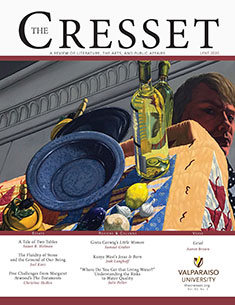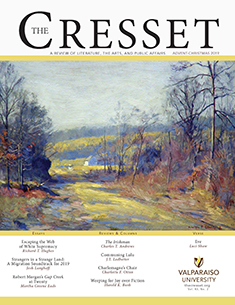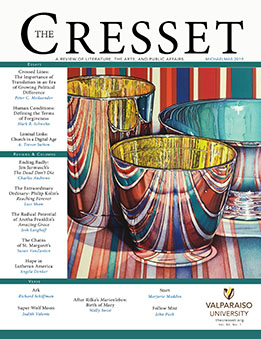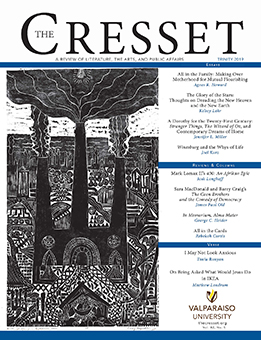“Every
profession has its growing arsenal of jargon to throw dust in the eyes of the
populace.”
William Zinsser, On Writing Well.
Last summer I spent eight days at a seminar for mid-career Presbyterian ministers. I cannot remember a better organized continuing education event. As I tried to describe the experience on returning home, I remembered a conversation I had, repeatedly, with a member of my congregation.
“How are you, Lyle?”
“I can’t complain.”
“You could if you tried! Put some effort into it!”
Lyle could spend half an hour telling me why he does not complain, though he has some darn good reasons to; complaining is just not for him. Besides, he would add, “It doesn’t do any good anyway.”
I suppose I could find things to complain about. The third day at supper as I went through the buffet, I grumbled, “Cheesecake! Again?” But even this was a mere parody of the complaining that I am now completely indifferent to from members of my congregation. It was a high quality event all around. I’m left to meta-complaining, complaining about the fact that there was nothing to complain about.
Some of my colleagues asked whether I was taking notes for one of my humor columns. And I told them, in all sincerity, “You’re all so professional, ethical, healthy, and differentiated that there’s really nothing funny to write about.” Maybe the fact that this event was only open to mid-career pastors had something to do with the quality of our cohort. The first ten years of ministry presumably weeded out the incompetents and knotheads.
I found myself laughing at some of the jargon that we used. For example, one of my female colleagues said that her “growing edge” was “learning to say ‘no’.” At a basic level, this is hardly a skill one needs to perfect. Your garden variety two-year-old has it down pat. Still, clergy tend to be “quivering mounds of availability,” as we were reminded at the opening plenary lecture. Many of us find ourselves overcommitted, stressed, and facing professional burn out because we cannot say “no.”
On our lone off-campus field trip we went to a variety store that could have been in Mayberry about 1961. For sale was a little battery powered device that said “no” one of six different ways each time its button was pressed. “No.” “No, no, no, no, no, no.” “No!” It’s the kind of thing you can laugh at for thirty seconds, even though it will sit on your desk for twenty years. Still, it made me understand that there are lots of ways to say “no,” and the savvy pastor should be able to say it more than one way.
There are different “no’s” I use as a father too. Currently, one model I’m using a lot is, “My ‘no’ is not the beginning of debate.” This one comes in handy with my fifteen year old. It has the finality of a cigarette snubbed out into a full ash tray.
When the president of my congregation’s Presbyterian Women’s group invites me to the fall retreat in Oconto, I cannot simply say “no.” I need to say something like, “It’s kind of you to ask me, but…” or “I’m flattered that you thought of me, but…”
Other invitations can be declined more forcefully. Miss Manners suggests using a combo-platter of “That won’t be possible” and “It’s simply out of the question” alternated until the favor asker gives up.
A few years ago someone taught me the different meanings of “Bless her heart,” when spoken by Southern women. I now use this phrase as a verbal crossed fingers behind my back. I say “Bless your heart,” but I mean:
- Each day in my prayers I lament that you had children, or
- As far as I can tell, your sole purpose on this planet is to irritate everyone you encounter, or
- Given a choice between having white-hot tungsten spikes thrust through my lungs, and accepting your invitation, I’m going with the spikes, or
- Remember that device I told you about that measures my hostility? Your request has rendered it obsolete, or
- I hate you.
My favorite way to say “no,” is “I’m sorry, I have a subsequent commitment.” This one goes back to the Watergate hearings before Congress. There was confusion about the meaning of “subsequent;” some witnesses used it meaning “prior.” No one caught this then, and no one has caught it in the twenty years I’ve been saying it. It’s completely honest. “Tom, wanna do this thing at my house that sounds tedious and awful?”
“No thanks, I have a subsequent commitment.” And I always find that I do. Subsequent to the invitation, I am committed to doing something else, like playing Uno with my kids or vacuuming the station wagon or sitting in the living room staring off into space. These commitments I find much more rewarding than viewing the YouTube video of your visit to the podiatrist. Go ahead and think my commitment was prior to your invitation; I told the truth.
Sometimes ministers decline invitations by saying, “That’s not my gift.” One of the nice things about having twenty years of experience is the self-knowledge that other people are better suited to do something one has been asked to do. Not that this task is not worthy of attention, it is. Other people are better suited to do this.
Non-church professionals convey this same idea by saying, “I suck at that.” I, personally, use this phrase in church settings; I find one of my gifts is to use vulgarity to jarring effect. It works for me; I shit you not.
Another bit of jargon I heard at the conference was, “Hold me accountable.” As in, “When I get back to the office, I’m going to ask my secretary to really hold me accountable on this.” The lay equivalent of this phrase is something like, “Nag me, please.”
Clergy who are working too hard and need to step back say, “I’m giving myself permission to ______.” I have always found this to be a tedious expression of desperation because usually we permit ourselves to take a day off, or not leave the shower to answer the phone. We have to excuse ourselves to live ordinary lives, as if we’re slipping back into the phone booth and taking off the cape. Please. Take your day off, then take a second day off, from the guilt of taking your day off in the first place.
The bit of professional jargon I learned last summer was, “Let’s unpack that.” This is a very handy bit of verbal punctuation. The savvy pastor, when attacked, repeats the charge, then says, “Hmm, let’s unpack that…” then proceeds to explain, calmly and clearly, using “I” statements, at least five different ways that the person making the attack is wrong, perhaps delusional. For maximum effect, the pastor should fiddle with a pipe.
Finally, I fell into using this phrase at the conference, “That’s a Family of Origin Issue.” I found, again for the millionth time, that my family of origin marked important occasions with food. We marked unimportant occasions with food. We communicated almost entirely with food. And we hated to waste anything, especially food. Food is more than fuel to us. It is currency; it is love. Food is what you eat; it is what eats you. So when I speared the last bite of cheesecake off a neighbor’s plate (I really, really thought she wasn’t going to eat it because her family of origin is from “The Anti-Clean Plate Club Planet.”), it’s a Family of Origin Issue. That sounds so much better than, “I’m batshit crazy.” It really means, “Compared to the people who raised me, I’m pretty OK. You’re not gonna leave that piece of crust on your plate, are you?”
At least that week I gave myself permission to do that.
The Reverend Thomas C. Willadsen is pastor of the First Presbyterian Church in Oshkosh, Wisconsin. He gave the 2013 Bibfeldt Lecture at the University of Chicago Divinity School.













